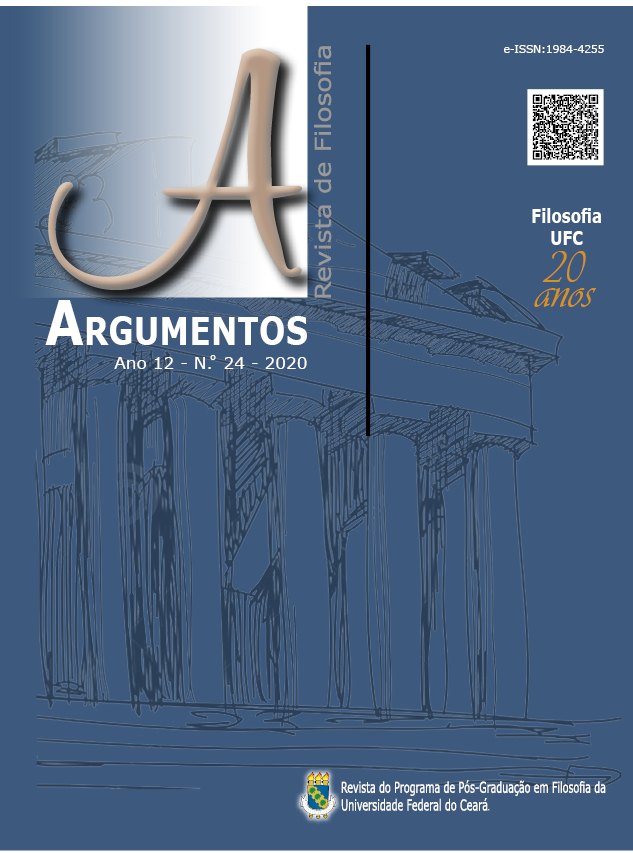Tomás de Aquino and Epifanio de Moirans: just war and slavery
DOI:
https://doi.org/10.36517/Argumentos.24.17Keywords:
Aquinas. Epifanio de Moirans. War. Justice. SlaveryAbstract
Analysis of the relatioship between just war and slavery in Aquinas and Epifanio de Moirans. I will argue that Aquinas’ work cannot be seen as a slave project based on his notion of just war. Epifanio de Moirans’ work represents an exemple of receiving Thomas Aquinas’ thought and his moral criteria about war. Moirans integrates Aquinas’ vision in his anti-slavery discourse on the titles of slavery by just war during the Scholastica colonialis, that is, during the period of reception and development of Baroque Scholasticism in Latin America (16th-17th centuries).
References
AERTSEN, Jan. Nature and Creature: Thomas Aquinas’s Way of Thought. Leiden: E. J. Brill, 1988.
AERTSEN, Jan. Natural Law in the Light of the Doctrine of the Transcendentals. In: L. J. Elders and K. Hedwig (eds.), Lex et Libertas. Freedom and Law According to St. Thomas Aquinas, Vatican City, 1987.
ANDRÉS-GALLEGO. José. La esclavitud en la América española. Madrid: Encuentro, 2005.
BARRERA, Jorge M. A Política em Aristóteles e Santo Tomás, Trad. e prefácio: Carlos Ancêde Nougué. Rio de Janeiro: Sétimo Selo, 2007.
CORETH, Emerich. Was ist der Mensch? Grundzüge einer philosophischen Anthropologie. Tyrolia-Verlag Innsbruk, 1976.
CORETH, Emerich. Grundfragen der Hermeneutik. Freiburg im Breisgau: Verlag Herder, 1969.
DAVIS, David. B. The Problem of Slavery in Western Culture. Oxford: OUP, 1966.
D’OCA, Fernando R. Montes. O Discurso Antiescravista de Epifanio de Moirans sobre os Títulos de Escravidão. Síntese-Revista de Filosofia. Belo Horizonte, v. 44, n. 139, 2017 (a), p. 279-303.
D’OCA, Fernando R. Montes. Epifânio de Moirans (1644-1689) e a escravidão negra: Uma análise do título de escravidão por guerra justa. In: CORREIA, A.; PICH R. H.; SILVA, M. A. O da. Filosofia medieval. Coleção XVII Encontro ANPOF: ANPOF, 2017 (b), p. 206-221.
D’OCA, Fernando R. Montes. Tráfico de Escravos e Consciência Moral: O pensamento antiescravista de Epifânio de Moirans. In Dissertatio. 46, 2017 (c), p. 130-172.
ELDERS, Leo. The Ethics of St. Thomas Aquinas. Frankfurt am Main: Peter Lang, 2005.
FINNIS, John. Natural Law and Natural Rights. Oxford, 1980.
FINNIS, John. Aquinas. Moral, Political and Legal Theory. Oxford, 1998.
FINNIS, John. Natural Inclinations and Natural Rights: Deriving ‘Ought’ from ‘Is’ according to Aquinas. In: L. J. Elders and K. Hedwig (eds.), Lex et Libertas. Freedom and Law According to St. Thomas Aquinas, Vatican City, 1987, p. 43-55.
GARCÍA, José Tomás L. Dos Defensores de los Esclavos Negros en el Siglo XVII. Maracaibo: Biblioteca Corpozulia; Caracas: Universidad Católica Andrés Bello, 1982.
GONZÁLEZ, Miguel P. Estudio Preliminar. In: MOIRANS, E. Siervos Libres. Madrid: CSIC, 2007.
GONZÁLEZ, Miguel P. Doctrina antiesclavista de Epifanio de Moirans en su Servi Liberi. Naturaleza y Gracia, v. 52, n. 2, 2005, p. 279-327.
GONZÁLEZ, Miguel P. Epifanio de Moirans: misionero capuchino y antiesclavista. Collectanea Franciscana, n. 74, 2004, p. 111-145.
HANKE, Lewis. The Spanish Struggle for Justice in the Conquest of America. Philadelphia: University of Pennsylvania Press, 1949.
HÖFFNER, Joseph C. La Ética Colonial Española del Siglo de Oro. Madrid: Cultura Hispánica, 1957.
HÖSLE, Vittorio. Morals and Politics. Translated by Steven Rendall. Notre Dame, Indiana: University of Notre Dame Press, 2004.
LIMA VAZ, Henrique C. de Escritos de Filosofia V: Introdução à Ética Filosófica. 2ª ed. São Paulo: Ed. Loyola, 2000.
MACINTYRE, Alasdair. Justiça de Quem? Qual Racionalidade? Loyola, São Paulo, 1991.
MOIRANS, Epifanio de. Siervos Libres: Una propuesta antiesclavista a finales del siglo XVII. Ed. M. González. Madrid: CSIC, 2007. (CHP II, v. 14)
MOIRANS, Epifanio de. Siervos Libres. In: GARCIA, J. Dos Defensores de los Esclavos Negros en el Siglo XVII. Maracaibo: Biblioteca Corpozulia; Caracas: Universidad Católica Andrés Bello, 1982. p. 179-298.
MOLINA, Luís de. De iustitia et iure. Coloniae Allobrogun: Marci Michaelis Bousquest, 1733.
PICH, Roberto H. Alonso de Sandoval and the Ideology of Black Slavery. Patristica et Mediaevalia, n. 36, 2015, p. 51-74.
PICH, Roberto H. Recepção e desenvolvimento da Escolástica Barroca na América Latina, séculos 16-18: notas sobre a contribuição de Walter Bernard Redmond. Scripta, vol. 4, n. 2, 2011, p. 81-102.
PIEPER, Joseph. Virtudes Fundamentais: As virtudes cardeais & teologais. São Paulo: Cultor de Livros, 2018.
PROUVOST, Géry. Thomas d’Aquin et les thomismes, Paris: Éditions du Cerf, 1996.
RICOEUR, Paul. Ética e Moral. In: Em torno ao Político. Trad. Marcelo Perine. São Paulo: Loyola, 1995.
SARANYANA, Josep-Ignasi. As controvérsias ético-mercantilistas sobre a legitimidade da escravidão. In: A Filosofia Medieval: Das origens patrísticas à escolástica barroca. Trad. Fernando Salles. São Paulo: Instituto Brasileiro de Filosofia e Ciência “Raimundo Lúlio (Ramon Llull), 2006, p. 557-571.
TOMÁS DE AQUINO. Summa theologiae. Rome: Editiones Paulinae, 1962.
TOMÁS DE AQUINO. Summa theologiae Opera Omnia IV-XII (ed. Leon.), Rome 1889-1906.
TOMÁS DE AQUINO. Suma Teológica. Vol. V. São Paulo: Ed. Loyola, 2004.
TOMÁS DE AQUINO. In Aristotelis libros Physicorum. Opera Omnia II (ed. Leon.), Rome, 1884).
VELDE, Rudi te. Aquinas on God: the 'Divine Science' of the Summa Theologiae. (Ashgate Studies in the History of Philosophical Theology), Englend/USA, 2006.
Downloads
Published
Issue
Section
License
Argumentos magazine is licensed under an International Creative Commons Attribution License.
The Magazine uses CC BY inclusion
1) The authors retain the copyright granted to the magazine or the right to initial publication, with the work regularly licensed under the Creative Commons Attribution, which allows the sharing of the work with acknowledgment of authorship and initial publication in this magazine.
2) The authors are authorized to contract additional applicable contracts, for non-exclusive distribution of the version of the work published in this journal (for example, publication in the institutional repository or as a chapter of the book), recognition of authorship and initial publication in this journal.
3) Authors are authorized and encourage to publish and distribute their work online (for example, in institutional repositories or on their personal pages) at any time before or during the editorial process, as they can generate productive changes, as well as increase the impact and reference of published work.




.jpg)










._._3.png)
1.jpg)
._._._.png)
